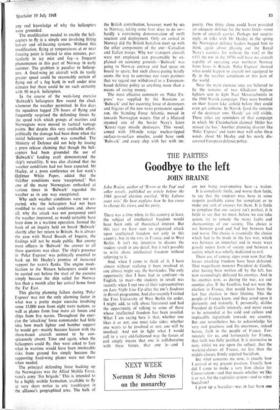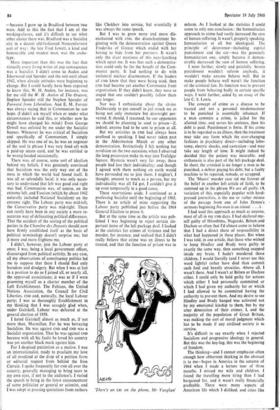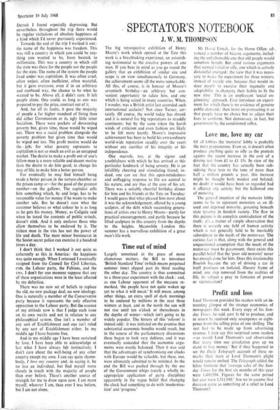Goodbye to the left
THE PARTIES JOHN BRAINE
John Braine, author of 'Room at the Top' and other novels, published an article before the 1964 general election entitled, 'Why Labour must win.' He here explains how he has come to change his views, and his party.
There was a time when, in this country at least, the subject of intellectual freedom would have been only of theoretical interest. But this year we have seen an organised attack upon intellectual freedom not only in this country. but in the USA. in France, and in West Berlin. It isn't my intention to discuss the student revolt in any detail, but it isn't possible to write about intellectual freedom without referring to it.
And, when I come to think of it, I have almost without realising it been involved at, one almost might say, the barricades. The only opportunity that I have had to confront—in English, to meet—the students in revolt was recently when I met two of their representatives on Late Night Line Up after the BBC'S Students in Revolt programme. And also recently I visited the Free University of West Berlin (in order, I might add, to talk about literature) and had the opportunity of talking to some of those whose intellectual freedom has been assailed. What I am saying here is that, whether one likes it or not, one must take sides: whether one wants to be involved or not, one will be involved. And not to fight what I would call in a very old-fashioned way the forces of evil simply means that one is collaborating with these forces, that one is—and I
am not being over-emotive here—a traitor.
It is completely futile, and worse than futile, to say that the students may have in some respects justifiable cause for complaint or to make any sort of excuses for them. It is futile to complain that our society isn't perfect, it is futile to say that we must, before we can take action, try to remedy the many faults and shortcomings of our society. The choice is not between good and bad but between bad and worse. The choice is essentially the choice which had to be made in the last war, which was between an imperfect and in many ways grossly unjust form of society and between a society which was wholly dedicated to evil.
There are, of course, signs even now that the forces attacking freedom have been defeated. That magnificent monster President de Gaulle, after having been written off by the left, has now resoundingly defeated his enemies. And in his enemies now, as during the war, are our enemies also. If the Gaullists had not won the election in France, that would have been the last free election in their lifetime. This the people of France knew, and they acted upon it gloriously and instantly. I, personally, dislike President de Gaulle intensely, and never cease to be astounded at his cold and callous and implacable ingratitude towards my country. But one nevertheless has to acknowledge his very real greatness and his enormous, indeed heroic, faith in the people of France. For- tunately for us, and fortunately for France, that faith was fully justified. It is instructive to note, whilst we are upon the subject, that the working-classes of France, no less than the middle-classes, firmly rejected Socialism.
But what concerns me now, is exactly how I arrived at my present position. Exactly how did I come to make a very firm choice for Conservatism—and that means whether we like it or not, for the capitalist system—and to reject Socialism?
I grew up a Socialist—was in fact born one
—because I grew up in Bradford between two wars. Add to this the fact that I am of the working-classes, and it's difficult to see what other choice there was. Bradford was a Socialist city in a decent old-fashioned Nonconformist sort of way : the late Fred Jowett, a kind and honourable and modest man, was the arche- type.
More important than this was the fact that virtually every living writer of any consequence was a Socialist. I didn't come to. Auden and Isherwood and Spender and the rest until about 1942, when already attitudes were beginning to change. But I could hardly have been expected to know this. W. H. Auden, for instance, was for me still the W. H. Auden of The Orators, Stephen Spender still the Stephen Spender of Forward from Liberalism. And E. M. Forster was always saying that in Communism he saw hope. (I didn't ask myself when or under what circumstances he said this, or whether now he might have changed his mind.) Even George Orwell was enlisted by me under the Socialist banner. Whenever he was critical of Socialism and specifically of Communism, I simply skipped. He was one of us, he was an engineer of the soul (a phrase I was very fond of) with a paid-up union card, and he was entitled to be wrong-headed occasionally.
There was, of course, some sort of idealism behind my beliefs. I was genuinely convinced that Socialism was the only way out of the mess in which the world had found itself. It was all so splendidly lucid; it was only neces- sary to understand that left was good and right was bad. Communism was, of course, on the extreme left, and Fascism (which by about 1942 naturally included National Socialism) on the extreme right. The Labour party was mid-left, the Conservative party was mid-right. There can rarely have been in any society a more in- accurate way of delineating political differences. That the accident of the seating of the political parties in the Chambre des Deputes should now have firmly established itself as the basis of political terminology doesn't surprise me; but it more and more frightens me.
I didn't, however, join the Labour party at once; I was, being a local government officer, discouraged from political activity. In any case, all my observations of constituency politics led me to suppose that there I should find only boredom and drudgery. But when I was at last in a position to do so I joined all, or nearly all, the approved associatious;,1t was as if I were grooming myself as a charter member of the Left Establishment. The Fabians, the United Nations Association, the Council for Civil Liberties, am and, naturally, the local Labour party; I was so thoroughly Establishment in my thinking that I was savagely glad when, under Gaitskell, Labour was defeated at the general election of 1959.
I hated Gaitskell almost as much as, if not more than, Macmillan. For he was betraying Socialism. He was against CND and CND was a Socialist organisation. That he was against ct.to because with all his faults he loved his country was yet another black mark against him.
For I despised patriotism as a motive. I was an internationalist, ready to proclaim my love of all mankind at the drop of a petition form or editorial request from behind the Iron Curtain. I spoke frequently for CND all over the country, generally managing to bring tears to my own eyes, if not to the audience's. I varied the speech to bring in the latest announcement of some politician or general or scientist, and I was adept at pressing quotations from authors
like Chekhov into service, but essentially it was always the same speech.
But I was to grow more and more dis- enchanted with CND, the disenchantment be- ginning with the demonstration against Queen Frederika of Greece which ended with her having to hide from her pursuers. It wasn't only the sheer nastiness of this near-lynching which upset me. It was that such a demonstra- tion could only be for the benefit of the Com- munist party. It had nothing to do with unilateral nuclear disarmament. If the leaders of CND knew that they were being used, then CND had become yet another Communist front organisation. If they didn't know, they were so stupid that one couldn't possibly follow them any longer.
Nor was I enthusiastic about the sit-ins. Deliberately to put oneself in jail struck me as being not only immature but downright per- verted. It should, I reasoned, be our opponents we should be planning to send to prison—if, indeed, anyone had to be sent to prison at all.
But my activities in CND had always been confined to speaking. I had never taken part in the Aldermaston March or any other demonstration. Instinctively I felt nothing but revulsion on the two occasions when I observed the long procession make its way into Trafalgar Square. Hysteria wasn't very far away, these people had lost their individuality; and though I agreed with them nothing on earth would have persuaded me to join them. I mightn't, I thought, amount to much as a person, but my individuality was all I'd got, I couldn't give it up even temporarily in a good cause.
These reservations aside, I continued as a professing Socialist until the beginning of 1965. There is an article of mine supporting the Labour party published just before the 1964 General Election to prove it.
But at the same time as the article was pub- lished I was beginning to reject certain im- portant items of the left package deal. I looked at the statistics for crimes of violence and for murder, for instance, and realised that I didn't really believe that crime was an illness to be treated, and that the function of prison was to 'There's an tat on the phone, Mr Vaughan' reform. As I looked at the statistics I could come to only one conclusion : the humanitarian approach to crime had vastly increased the sum of human suffering. It wasn't, properly speaking, humanitarian at all but ideological. The principle of deterrence—including capital punishment and the cat—was the genuinely humanitarian one, simply because it demon- strably decreased the sum of human suffering.
I went further, slowly and painfully. Severe punishment wouldn't reform anybody, it wouldn't make anyone behave well. But to make people behave well wasn't the function of the criminal law. Its function was to prevent people from behaving badly in certain specific ways. I went further, aided by an essay of the late C. S. Lewis.
The concept of crime as a disease to be treated and not a personal misdemeanour to be punished is essentially inhuman. If a man commits a crime, is jailed for the allotted time, and serves his sentence, then his debt is paid. Punishment is finite. If his crime is to be regarded as an illness, then the treatment may take any form which the ever-changing fashions in psychiatry direct—including lobo- tomy, electric shocks, and castration—and may take any length of time. It might indeed be decided that the patient was incurable; and euthanasia is also part of the left package deal. In short, the criminal is no longer a man to ix punished, a debtor paying his debt, but a faulty machine to be repaired, remade, or scrapped.
The 'Moors' murder case rid me forever of the belief in another left article of faith, to be summed up in the phrase We are all guilty. (A variation of this, especially popular with hard- pressed journalists, is the use or rather misuse of the passage from one of John Donne's sermons beginning No man is an island.
I had used this approach as much as anyone; most of all in my CND days. I had declared: my- self guilty of Hiroshima, Nagasaki, Belsemand Dachau so often that I'd almost come to believe that I had a direct share of responsibility in what had happened in these places. But when I was told, in one article, that those who wished to hang Hindley and Brady were guilty,in exactly the same way, then something snapped inside my brain. I hadn't murdered those children, I would literally (and I never use this word lightly) rather have died than commit such foul and beastly atrocities. Above, all, I wasn't there. And I wasn't at Belsen- or Dachau either. I could only be held guilty for actions which either I had personally committed or which I had given my authority for or which I had allowed to be committed having the authority to prevent them. And my desire to see Hindley and Brady hanged was activated not by my emotional kinship to them, but by my utter detestation of their crimes. I, and the majority of the population of Great Britain, was making the sort of moral judgment which has to be made if any civilised society is to survive.
It's difficult to say exactly when I rejected Socialism and progressive ideology in general. But this was the key-log, this was the beginning of freedom.
The thinking—and I cannot emphasise often enough how abhorrent thinking in the abstract is to me—began in America in the autumn of 1964 when I made a lecture tour of three months. I missed my wife and children, I found the travelling more tiring than I had bargained for, and it wasn't really financially profitable. There were many aspects of American life which I disliked, and cities like Detroit I found especially depressing. But nevertheless throughout the trip there would be regular visitations of absolute happiness of a kind which I'd never previously experienced.
Towards the end of the trip I worked it out: the name of the happiness was freedom. This was still a country in which you could be any- thing you wanted to be, from beatnik to millionaire. This was a country in which still the state was there for the people not the people for the state. The name of the system the people lived under was capitalism. It was often cruel, often unjust, often inefficient, often wasteful, but it gave everyone, even if in an arbitrary and confused way, the chance to be what he wanted to be. Above all, it didn't care. It left people alone. One could, as long as one was prepared to pay the price, contract out of it.
And, for all its faults, it gave the majority of people a far higher standard of living than did either Communism or its ugly little sister Socialism. There were pockets of devastating poverty but, given time, those would be wiped out. There was a racial problem alongside the poverty problem but given time that would be wiped out too. The profit motive would do the • job; for what poverty represents to capitalism is not so much an evil as an untapped market. The desire to make a profit out of one's fellow-man is a more reliable and decent motive than the desire to do him good, to change his way of life, to make him a better person.
For eventually he may find himself being made a better person in the torture-chamber or the prison camp or—for the good of the greatest number—on the gallows. The capitalist sells him something which, by and large, has to be reasonable value for money if he wants to make another sale. But he doesn't care what the customer believes or what colour he is as long as he gets his money. Money, as Caligula said when he taxed the contents of public urinals, doesn't stink. And it only enslaves those who allow themselves to be enslaved by it. The richest man in the USA has not the power of life and death. The most minor bureaucrat in the Soviet secret police can exercise it a hundred times a day.
I don't think that I worked it out quite as coherently as this in America : the happiness was quite enough. When I returned I eventually resigned from the Council for Civil Liberties, CND, the Labour party, the Fabians, and the UNA. I don't- for one moment suppose that any of these organisations were in the least affected by my defection.
There was no new set of beliefs to replace the old, no new package deal, no new ideology. One is naturally a member of the Conservative party because it represents the only effective opposition to the Labour party. But the essence of my attitude now is that I judge each issue on its own merits and not in relation to any philosophical system. One isn't a member of any sort of Establishment and one isn't ruled by any sort of Establishment either. In my middle age I have become free.
And in my middle age I have been sustained by love. I have been able to acknowledge at last what I have always felt instinctively. I don't care about the well-being of any other country except my own. I can say quite shame- lessly, I love my country and, in saying it, be no less an individual, but find myself more closely in touch with the majority of people than ever before. There's another source of strength for me to draw upon now. I am more myself, whoever I am, than ever I was before, but I am not alone.








































 Previous page
Previous page